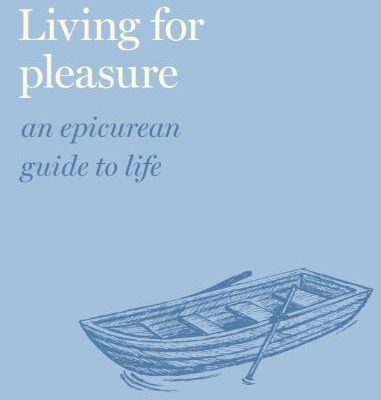Emily Austin’s “Living For Pleasure” (New Book On Epicurus 2022)
This is the review I posted to the Epicurean Philosophy Facebook page as well as to the EpicureanFriends forum. For much more information including own interview with Dr. Austin and our lengthy discussion of her book, click over to EpicureanFriends.com.
Yesterday I came across Emily Austin’s book “Living for Pleasure” for the first time, and I mentioned I would check it out. Today I want to report back that I have now finished reading it, and that I can strongly recommend it as a “popular” introduction to the philosophy of Epicurus. Ms. Austin is both an engaging writer and an experienced teacher-scholar, and she combines many great references with what I believe to be an excellent eye for interpreting Epicurus in almost every major area of controversy you might wish to examine.
The book is aimed at intelligent but non-specialist readers, and so it’s suitable for almost everyone. It is one of the most thorough and well documented current popular books on Epicurus that you will find anywhere, but it is so good it left me wishing it were even longer. I would like to have seen it spend more time on subjects such as Epicurus’ canonics / epistemology, but what we might wish for as perfect is not the enemy of the good, and this book is very very good. It includes insights that I have not seen anywhere else, such as her suggestion for how Lucretius might really have intended to close his poem, all very well documented with cites to the ancient texts.
I do want to include a caution that the book (like Catherine Wilson’s work) contains a number of opinions on current political issues with which not everyone will agree. Those might not eventually prove to be as “evergreen” as the great majority of the rest of the book, and I personally would have been happier if the book had contained more on canonics / epistemology and less on difficult topical issues in which it might be better to “wait” or consider Epicurus’ view of multiple possibilities. Readers should not think that they should measure their personal fidelity to Epicurus based on their current evaluations of John McCain or John F. Kennedy, or on where they stand on the many similar “cultural” issues that she mentions as her own application of Epicurean views.
But I am sure that Ms. Austin would say that her book was intended to be just a starting point for someone interested in Epicurus, and from that perspective it’s easy to see why a writer would want to supply personal potential applications. She is surely right that Epicurus did not shy away from political engagement when warranted, and it’s up to us to evaluate the facts and take the positions that suit our own circumstances, just as Epicurus did on issues such as the size of the sun and various other difficult questions where evidence is limited. Epicurean philosophy doesn’t guarantee that we will be “right” in every decision we make in life, but it does give us the best path toward the best quality decisions we can make with the evidence available to us.
This book is a great addition to the arsenal of books for those who want to “strike a blow for Epicurus,” and I highly recommend it to all readers of the Epicurean Philosophy Group.
PS: Maybe I should add that until yesterday I don’t think I had ever heard the name “Emily Austin,” and even now I know nothing about her other than what read in the book and her article. So my recommendation does not arise from any personal or professional or paid motivation to endorse. I just like the book.
PPS 012623 In the short time since this review was posted I have become much more familiar with Dr. Austin’s book and her views, as displayed in several podcast interviews. My enthusiasm for the book and for Dr. Austin’s approach to Epicurus continues to grow. All readers of NewEpicurean.com are strongly encouraged to check out her book and watch for her podcast interviews.

